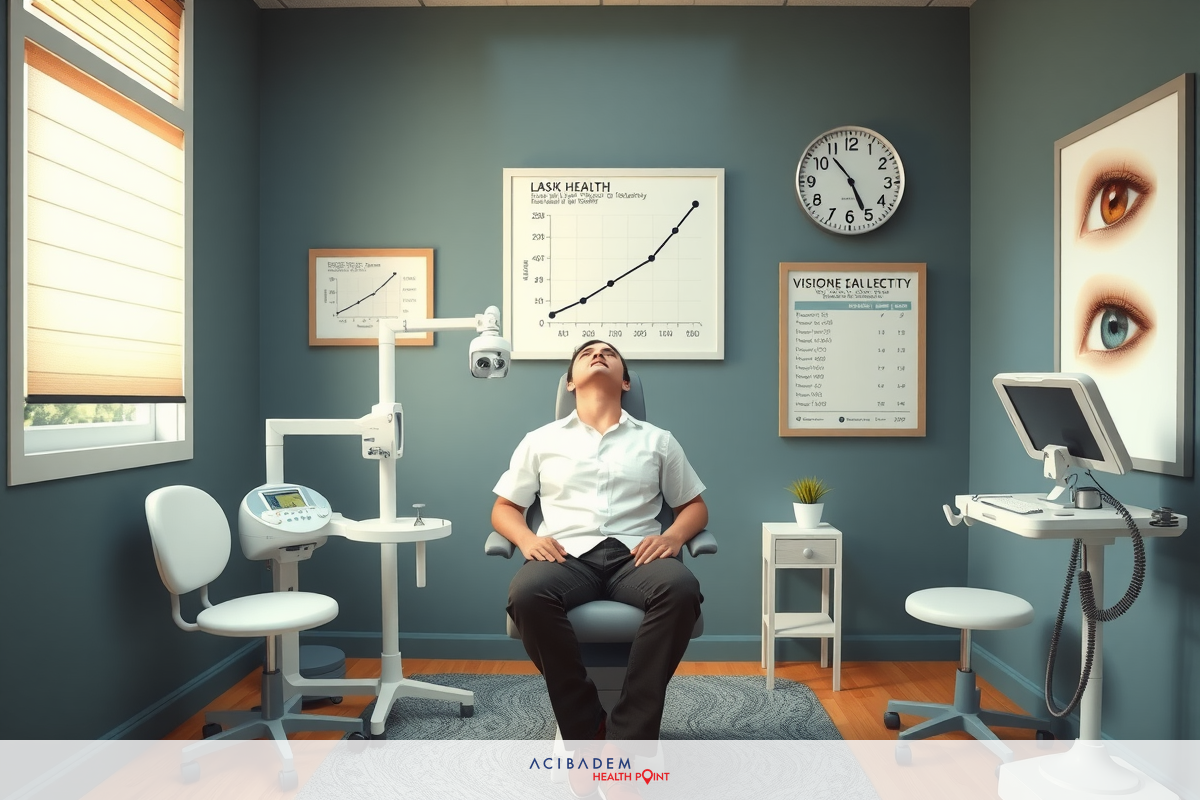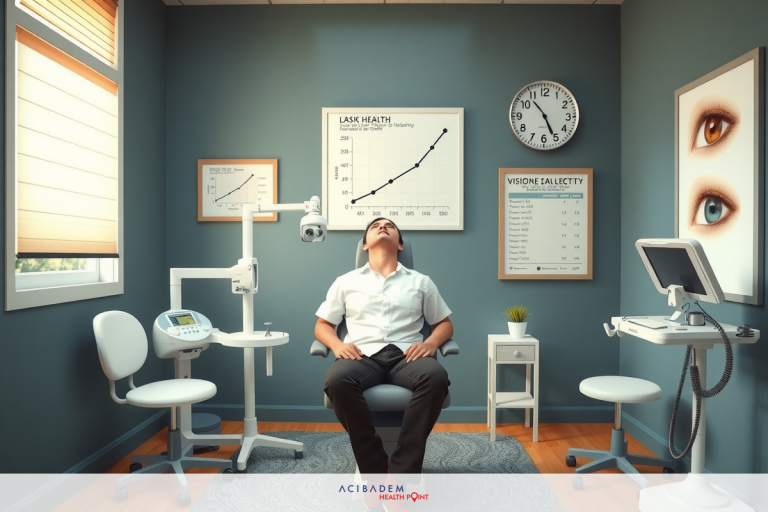Does LASIK Increase Rate of Eye Deterioration
Does LASIK Increase Rate of Eye Deterioration LASIK surgery is widely opted for due to its quick results and relatively painless procedure. The process involves reshaping the cornea, which ultimately improves visual acuity. A question that often arises from potential patients revolves around the long-term effects of such an intervention.
The primary concern lies in whether undergoing LASIK could potentially increase the rate at which one’s eyes deteriorate over time. Scientific studies have dedicated resources towards determining any correlation between this popular form of vision correction and accelerated eye deterioration. This topic invites further conversation on eye health after LASIK – a subject matter not extensively covered yet essential given its implications on quality of life post-LASIK.
Understanding LASIK Surgery
LASIK, an acronym for Laser-Assisted In Situ Keratomileusis, is a surgical procedure aimed at correcting vision problems. The goal of this surgery is to reshape the cornea – the clear front part of the eye that bends light entering the eye and helps focus it onto the retina at the back of your eye. Errors in this focusing process can lead to blurred vision or refractive errors such as myopia (nearsightedness), hypermetropia (farsightedness), and astigmatism.
The LASIK procedure begins with creating a thin flap on the surface of your cornea using either a laser or a special instrument known as a microkeratome blade. After lifting this flap, doctors use another type of laser called an excimer to carefully remove microscopic layers from your cornea’s inner portion. By adjusting its shape in this way, LASIK allows light that enters your eyes to be correctly focused onto your retina for clearer vision.
The appeal behind undergoing LASIK surgery lies not only in its ability to correct these refractive errors but also because it offers quick recovery times compared with other forms of corrective surgeries. Patients often report significant improvements in their visual acuity within 24 hours following surgery. Furthermore, despite being categorized as “surgical,” this intervention does not require any stitches or bandages – aspects contributing significantly towards patient comfort post-operatively.
As we continue our exploration into whether LASIK directly influences rates concerning eye deterioration over time, understanding what constitutes ‘eye deterioration’ becomes crucially important too – particularly within context pertaining specifically towards long-term effects subsequent to having undergone vision correction procedures like LASIK.
Long-Term Effects of LASIK
LASIK surgery does warrant a deeper look into potential long-term effects on eye health. A significant majority of patients experience lasting vision improvement after undergoing LASIK; however, it’s important to note that this procedure is not immune to the natural aging process affecting our eyes. Presbyopia, or age- related farsightedness, can still occur in patients who have previously had LASIK.
The longevity of results post-LASIK primarily depends upon whether any refractive errors were fully corrected during the initial surgery and how individual eyes respond over time. For instance, nearsighted individuals might notice their vision gradually becoming less sharp as they age because their eyes continue to grow longer – something which could influence the overall success rate of their original LASIK correction.
Dryness is another commonly reported side effect following LASIK surgery – an issue that can persist beyond initial recovery periods. The severity and duration vary between individuals but may cause
discomfort and impact daily activities such as reading or driving at night due to increased glare sensitivity. It is

essential for prospective patients considering this form of corrective eye procedure to be aware that symptoms like these might need management with lubricating drops or other treatments even years post- surgery.
There are certain rare cases where more severe complications such as keratectasia (bulging cornea), epithelial ingrowth (cells growing under the flap), or diffuse lamellar keratitis (inflammation) may occur post- operatively. These situations require prompt medical attention and possibly further surgical intervention.
As we explore the potential connections between long-term effects of LASIK procedures and their impact on the ongoing deterioration of recipient patients’ eye health, it becomes clear that ongoing research plays a crucial role in uncovering truths about ocular health concerns over extended post-operative periods.
Research on Eye Deterioration after LASIK
Scientific research aimed at ascertaining whether LASIK surgery could potentially expedite eye deterioration has been a topic of interest within the medical community. The consensus remains somewhat divided due to the multifaceted nature of factors involved in determining what constitutes ‘deterioration.’ For instance, while some patients may experience dry eyes or night vision problems post-LASIK, it is debatable whether these complications equate to overall eye health deterioration.
Several studies conducted globally have attempted to measure long-term outcomes and possible side effects following LASIK surgeries. A common finding across many of these studies is that most patients retain their improved vision for many years post-surgery, albeit with potential minor regression over time. This regression frequently correlates more closely with natural aging processes rather than being a direct result of having undergone LASIK.
Another noteworthy point from various research endeavors revolves around how certain pre-existing conditions can impact long-term results. People with severe myopia (nearsightedness), for example, could experience more significant changes in their eyesight over time compared to those who underwent LASIK correction for mild refractive errors. Such individuals might be more prone towards requiring additional corrective measures like glasses or contact lenses several years down the line.
Concerns about corneal thinning and ectasia – a condition where cornea bulges outward causing blurred vision – do exist within contexts pertaining specifically towards post-LASIK scenarios; however, it’s important noting incidences thereof remain relatively rare according observations collated across numerous scientific studies conducted thus far.
As we continue our journey addressing queries surrounding links between undergoing procedures like LASIK towards rates concerning subsequent eye health degradation – insights gathered from ongoing research initiatives worldwide contribute significantly towards deeper comprehension associated with complexities inherent within this fascinating subject matter.
Frequently Asked Questions
What is the primary purpose of LASIK surgery?
The main goal behind performing LASIK procedures involves correcting refractive errors such as myopia, hypermetropia, and astigmatism. By reshaping your cornea using lasers, light entering your eyes can be accurately focused onto the retina - resulting in improved vision.
Are there any long-term side effects associated with undergoing LASIK surgery?
Yes, potential long-term effects do exist post-LASIK. While most patients retain their improved visual acuity over time, certain complications like dry eyes or minor regression in vision quality may occur due to natural aging processes affecting our eyes or pre-existing conditions influencing outcomes.
Can having undergone a procedure like LASIK expedite rates concerning eye deterioration later on?
Scientific studies aiming towards determining links between LASIK surgeries and subsequent eye health degradation remain somewhat inconclusive due to complexities involved in defining 'eye deterioration.' While some patients experience symptoms such as dryness or night glare issues post-procedure – it's debatable if these equate directly towards an overall increase concerning eye health deterioration rates.
Are individuals with severe myopia more prone towards requiring additional corrective measures after having had LASIK surgery performed initially?
Research does indicate that people who underwent initial correction for severe myopia could potentially experience more significant changes in their vision over time compared to those corrected primarily for mild refractive errors. As a result thereof - they might require secondary corrective measures such as glasses or contact lenses several years down the line.








